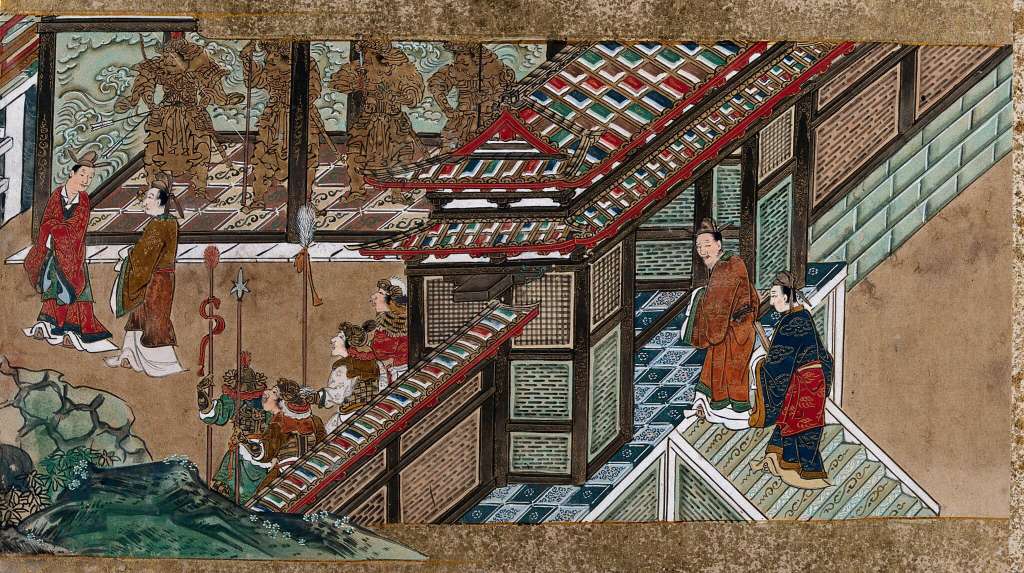YOUNG LI SHIMIN was a smart boy. At the age of 14, his intelligence and assurance were so impressive that an official of the Chinese royal court announced he had a “gift” for him. It was a girl, the official’s niece. She was 12. The two children married – and from then on, Li was on the road to becoming an extraordinary adult. He joined the army and quickly climbed the ranks.
The junior couple lived in the Sui Dynasty in the early AD600s. They didn’t know it at the time, but they were living in the final years of that ruling family – and they themselves would usher in a new dynasty that would become known as one of the Golden Ages of Chinese history: the Tang Dynasty.
HIS BROTHER HAD TO GO
Now we fast-forward to the summer of the year 626, when Li Shimin was approaching his 28th birthday, and his wife was 26. Now a high-ranking soldier, he had commanded troops through numerous battles. More recently, he had almost been killed by his own brothers, as each of the young men in the family became rivals, seeing themselves as the next ruler of China.
That summer, Li ambushed and killed his older brother, and then made himself deputy to the emperor. Just two months later, the ruler gave up his throne to the forceful young man – who from then on took a new name, becoming known as Emperor Taizong of Tang.

ZHENGUAN ERA
Li Shimin ushered in the Tang Dynasty, and the following period, from 4 September 626 to 10 July 649, was given the title of the Zhenguan (貞觀) era (tradition requires each reign to have its own name). The Reign of Zhenguan is remembered as a period of unrivalled success for the kingdom, and other rulers of China have studied it ever since. The nation thrived both in military and economic terms, and the capital, Changan, became probably the largest city on earth.
People from around the world travelled to visit Changan, and as more and more of them travelled along the road through Xinjiang to the great city of the east, the Silk Road developed into the most important business route in the world.
LEARNING FROM THE PAST
Tang Taizong took the lessons from the demise of Sui Dynasty, anxious not to repeat his predecessor’s mistakes. He paid attention to livelihood issues, made great efforts to govern fairly, humbly accepted advice (very rare for an emperor), stabilized society, and rejuvenated culture and education. The population grew, and a period of economic prosperity dawned.
One of his particular innovations was to choose officials personally. He understood the importance of having a talented team and recruited staff from around the world in an eclectic manner, disregarding people’s personal backgrounds, selecting people with genuine skills and virtuous personalities.

OPEN YOUR EARS
Studying history, Emperor Taizong realized that as each dynasty was approaching annihilation, a deadly flaw appeared: mediocre rulers would end up in charge, living in their own delusions, refusing to listen to people speaking the plain truth. He wanted his kingdom to avoid that fate.
Taizong had a wise adviser named Wei Zheng, and spent much time discussing affairs of the state with him. Wei Zheng gave him a practical suggestion: listen more. Be open to ideas and suggestions from others.
Wei Zheng dared to disagree with the ruler, sometimes at some risk to himself. At one stage, when there was a shortage of men in the army, ministers suggested that boys aged less than 18 could be recruited to work as government officers in various mansions. Taizong agreed.
But after the edict was issued, Wei Zheng halted the process. Taizong said that his advisor would be blamed directly for the failure of the project, but Wei Zheng was not fearful. He said that it was a bad idea, and argued against it, convincing the Emperor to cancel the scheme.
WIDENING THE SILK ROAD
Emperor Taizong attached great importance to agricultural production. He cut government expenditure to reduce the tax burden on the people. And he increased trade between numerous groups, increasing the number of livestock in the country, which caused farming to flourish. The Silk Road became wider and busier.

Four towns in a place called Anxi were established in the Western Regions to provide a certain degree of safety for merchants and tourists traveling between the East and the West. The government also maintained social order, leading to continuous business travel on the Silk Road, allowing a wide variety of goods to pass back and forth between the East and the West, making the Silk Road a golden corridor for the entire world.
NO YES MEN
Today, we remember Emperor Taizong of Tang for presiding over a golden age in China, but also for his unusual ability to listen to, and even invite criticism from his advisors, especially Wen Zheng.
China’s present leader, Xi Jinping, may well have had this historical character in mind when he shared an ancient quote during a meeting in Hebei: “A thousand yes-men cannot equal one honest advisor.”
Like reading history? Click here for a range of stories on history and culture
Image at the top is a montage of two works: Taizong of Tang, a work by Odano Nowtaki from the 18th century, and a Shûgetsu painting believed to date back to the early 1500s. Both are Public Domain.
